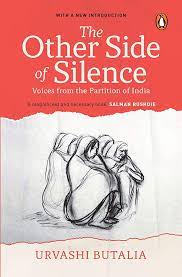ANALYSIS AND BOOK REVIEW: THE OTHER SIDE OF SILENCE: VOICES FROM PARTITION (BOOK BY URVASHI BUTALIA)
Author – Harjass Kaur Ramgadiya, Student at MNLU Nagpur (Maharashtra)
Best Citation – Harjass Kaur Ramgadiya, ANALYSIS AND BOOK REVIEW: THE OTHER SIDE OF SILENCE: VOICES FROM PARTITION (BOOK BY URVASHI BUTALIA), Voice of Freedom and Rights, 1 (1) of 2023, Pg. 90-103, APIS – 3920 – 0026 | ISSN – 2583 – 7982.
In The Other Side of Silence, Urvashi Butalia reveals the various layers of partition history as told to her, particularly by women. Close conversations bring back memories from the past. Butalia meticulously depicts the saga of displacement, victimisation, and the gruesome shattering of women’s bodies and souls.[1] History and politics always shape human existence, but the history of partition nearly eliminated women. They were so brutalised that they were rendered speechless. They were silenced and discarded. Their sense of belonging and citizenship was constantly called into question. As a result, the partition history is difficult to forget. Women attempted to live a half-life, erasing the past. Butalia starts her work by stating that two Indian poets believed that the history of the Partition was harmful to remember yet impossible to forget. The history of the partition includes incidents of violence against women. Sexual assaults against women, including as rape, kidnapping, forced marriage, and prostitution, have increased. Without morals or scruples, there was widespread sexual violence. Under the pretence of safety, honour, or purity, women’s rights were regularly infringed. The political split turned out to be a scheme to suppress women and brutally encroach upon them. Women have been used as pawns in power conflicts throughout history, and the partition of India was no exception. It left women with severe mental wounds that could not be healed. The injury got worse with worry of suffering more exploitation and abuse at the hands of family or the state.
[1] Jyoti Jaimini, “Gendering partition; hardship humanity harmony”, IJNRD, Volume 7, Issue 5 May 2022,Pg.73
